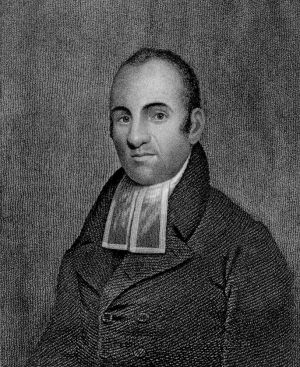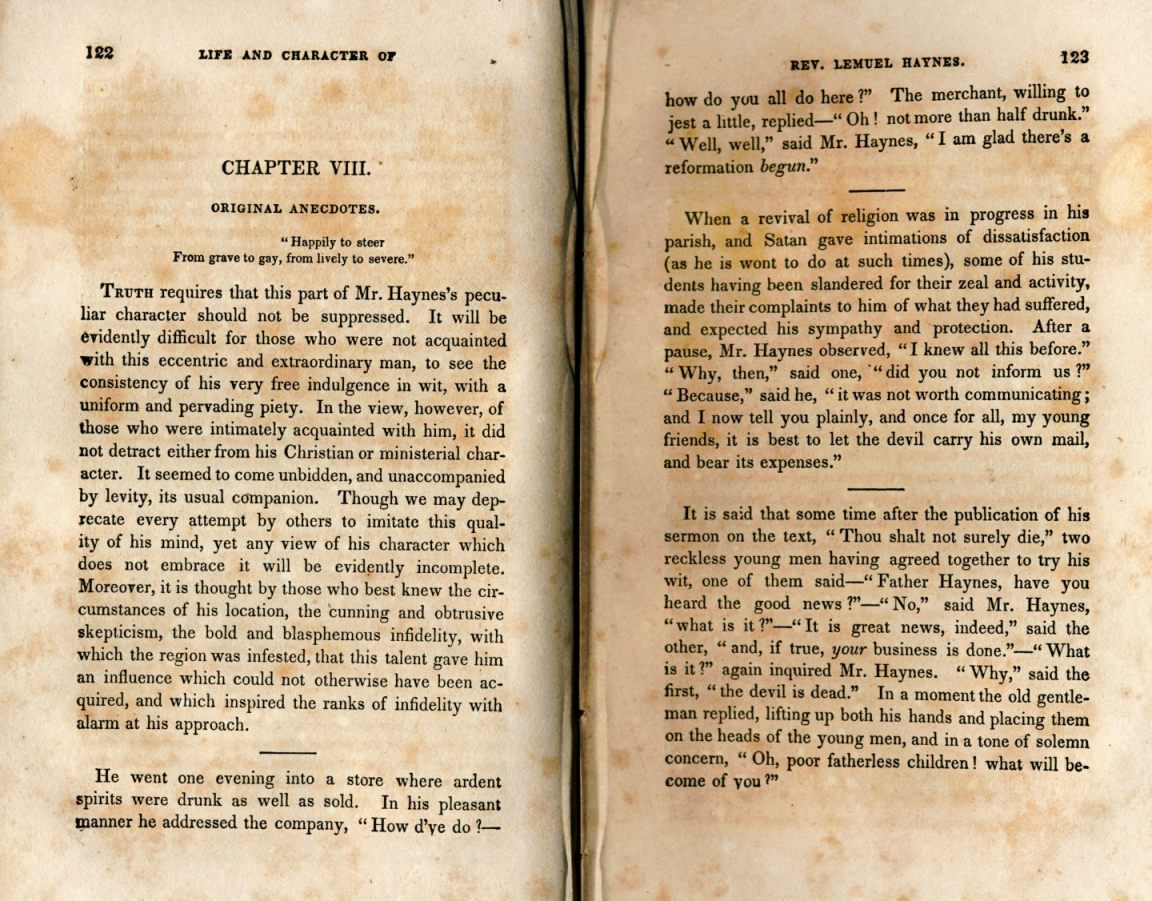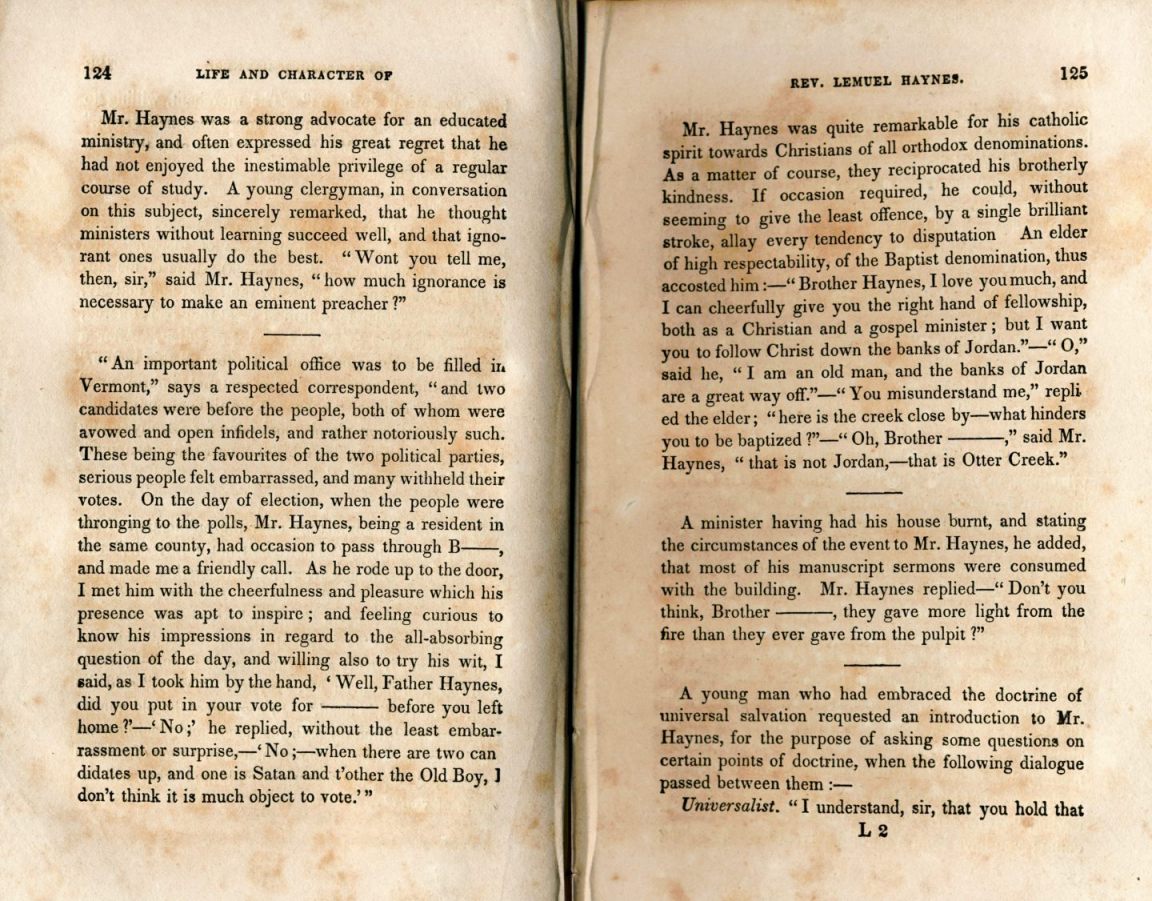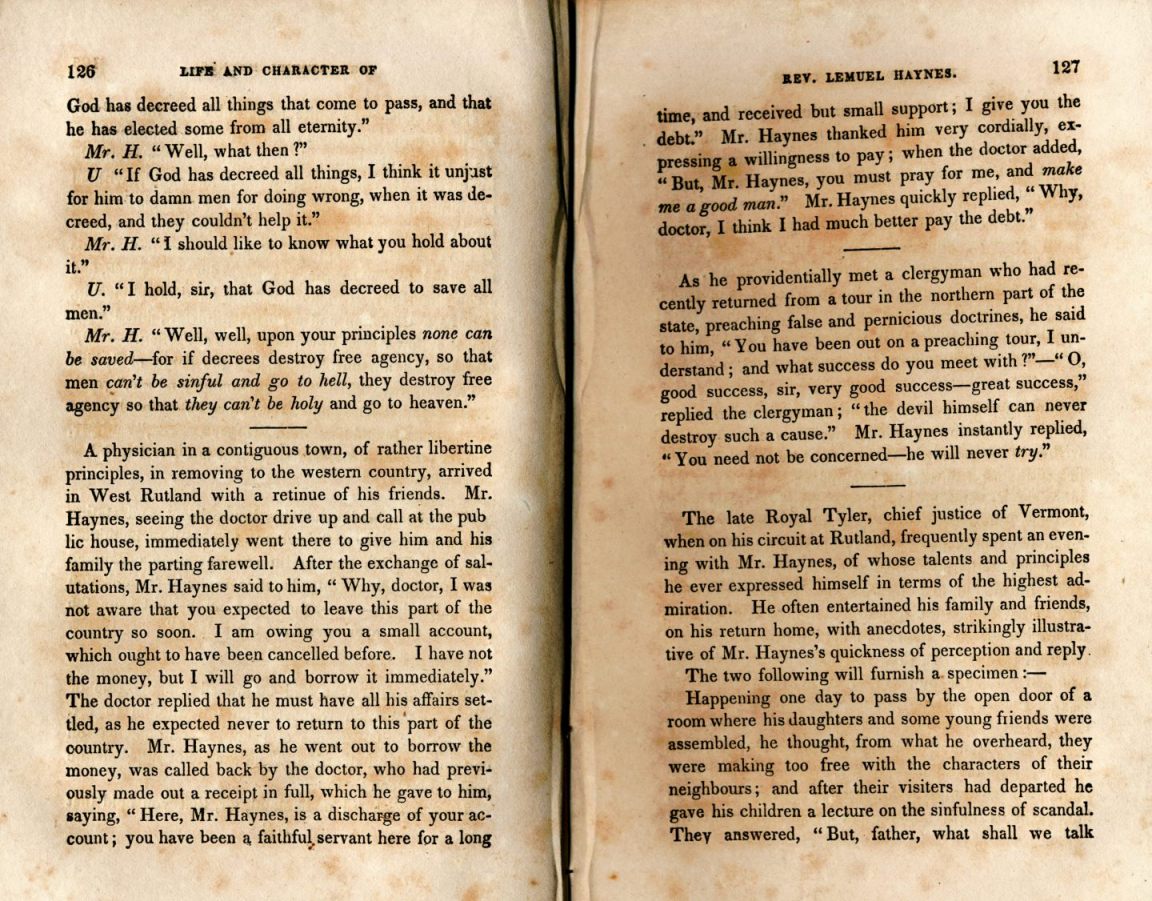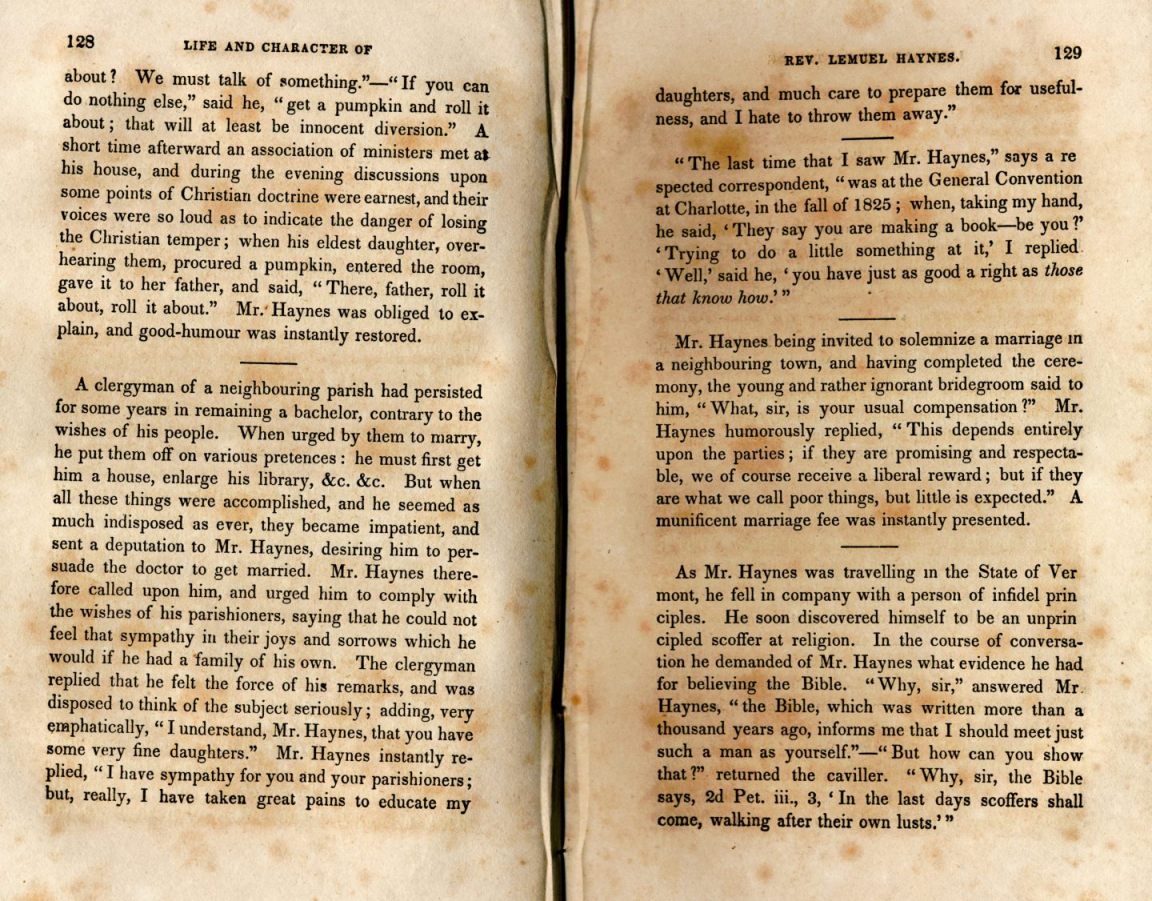Lemuel Haynes
Excerpts from a biography of Lemuel Haynes by one of his contemporaries:
Life And Character of the Reverend Lemuel Haynes
written in 1837 by Timothy M. Cooley
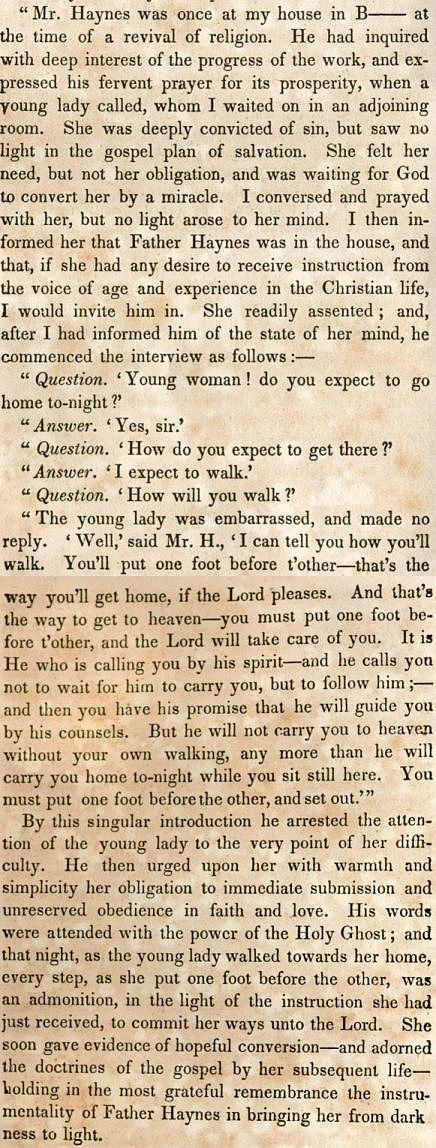
page 29
..."Mothers love, and love for ever." The affection of a mother to her new-born infant is one of the most powerful and active of the natural instincts. But mothers "may forget." This unhappy child was abandoned by his parents in early infancy, and was never, to the end of life, favoured with a single expression of a mother's kindness, he was thus an orphan, not by the bereaving hand of God, but by the cold neglect of those who ought to have been his most affectionate guardians. The tincture of his skin he knew to be an obstacle to his being identified in interest and in life with those among whom he dwelt. His susceptible mind soon began to feel its forlorn condition. In the bitterness of his grief, he must often have uttered his complaint in language like the following: " Let the day perish wherein I was born; let darkness and the shadow of death stain it." His mother refused to visit him or to see him. Tradition says, that when a lad, he providentially met his mother in an adjoining town, at the house of a relative; and then he fondly expected that he should at least receive some kind attentions from her. But he was sadly disappointed. She was determined to elude the interview. At length he caught a glimpse of her as she was attempting to escape from him. Vexed and mortified at such an instance of unnatural contempt from his mother, he accosted her in the language of severe but merited rebuke.
* "Mater! tu non timebas----semel; si timueras, -me a gravissimo dolore, atque te ipsam, a maximo pudore, servavisses."
" Mother you were not afraid once...had you been afraid I would have been saved from dire sorrow and yourself from the greatest shame."
Note:
To be fair, there might be forces at work on Lemuel's mother, Alice Fitch, that are not being mentioned in this history. Lemuel was born into a prominent and devout West Hartford family's household. It is telling that he was given the surname of the master of the house rather than her own or that of his father. She was probably an indentured servant. As cold as she is made to sound here, considering the rights of women or servants at that time, she may have been given little choice in the matter considering the upright nature of the families involved.
The following is a description of the family that raised Lemuel and their relationship to TM Cooley the author of the Haynes biography:
TIBBALS FAMILY TREE IN AMERICA BRANCH FROM THOMAS TIBBALS I TO THE GRANDCHIDREN OF JACK [&] MARJORIE (CORRIGAN) TIBBALS (Edited in 1985 by James R. Tibbals from letters written by Ethel Tibbals Osborne in 1966.)
In March 28,1759 John married this Olive Rose (first Olive) and she bore him two sons; John born in 1760 and David in 1761. She died 1762. The above David Rose Tibbals, whom we know to be our direct ancestor and Elizabeth, his wife took a "bound-boy" Lemuel Haynes, whose father was a Negro and his mother a white girl. His parents abandoned him and as there were no children's homes in those times, the county "bound him out"as a sort of indentured servant. He was only 5 weeks old and told in later life how his mistress treated him as "one of her own". He was born in Hartford on July 18,1753 and lived with the Rose (Tibbals) family until the Revolutionary War days when he joined the army and fought along with John Tibbals Sr., John Jr. and David Tibbals at Ticonderoga. This Lemuel Haynes was the first colored Preacher ordained in the Congregational Church. He married a white woman, Elizabeth Babbit of Dianton (actually Dighton a suberb of New Bedford) Massachusetts, a young and well educated white woman of excellent family. He died in Granville, New York, September 28,1834 while preaching there. Life story in small volume called "Memoirs of Lemuel Haynes", by Timothy M. Cooley - (an accurate account).
On the author of the Haynes biography: In 1792 John Jr. married Dorothy Cooley, daughter of William and Sarah Cooley and a sister of Timothy Mather Cooley, long time pastor of church in Granville. The second son was Wm John, my great-grandfather; the daughter was Olive Tibbals who married Stephens Holmes. (The elder son was Timothy Cooley Tibbals referred to in Rev. T. M. Cooley's address in 1845. He died before 1831.) In 1845 Granville celebrated the 50th year of Timothy M. Cooley's pastorate and in his speech he mentions the death of the 1St Timothy Cooley Tibbals and we know by the will of Dorothy Cooley Tibbals that he died prior to 1831, the date of that will. They-- the Granvillites observe this anniversary every 50 years (The next celebration is in 1995). The Church was known as the First Church of Christ Congregational.
The text below is a description of Congregationalists of that period.
A brief definitional comment is in order. Most of the authors alleging Puritans in New England have in mind Independents or Congregationalists, those groups of dissenters who insisted that no compromise with the Church of England was possible and who espoused a radical break with what they perceived to be an apostate church. Separatist conventicles in England and Holland as well as the Pilgrims of New England adopted this radical piety and polity. While many Puritans during Elizabethan times were able to exist within the English Church, Separatists were incapable of such compromise and defined themselves sociologically in local and congregationally autonomous groups. Their exile in Holland and North America was a consequence of their sectarian non-compromise in religion. Even when distinguishing Puritans and Separatists, the former are no longer viewed in exclusively doctrinal terms, e.g., such as being radical Calvinists. Congregationalist clergymen effectively corrupted and transformed Calvinism with this gradually evolving compromise during the eighteenth century, as opposed to the rigid prudence of the seventeenth century, their political thought did not usurp religious priorities.
From The Encyclopedia Britannica website
The Great Awakening:
http://en.wikipedia.org/wiki/First_Great_Awakening Congregational Church:
